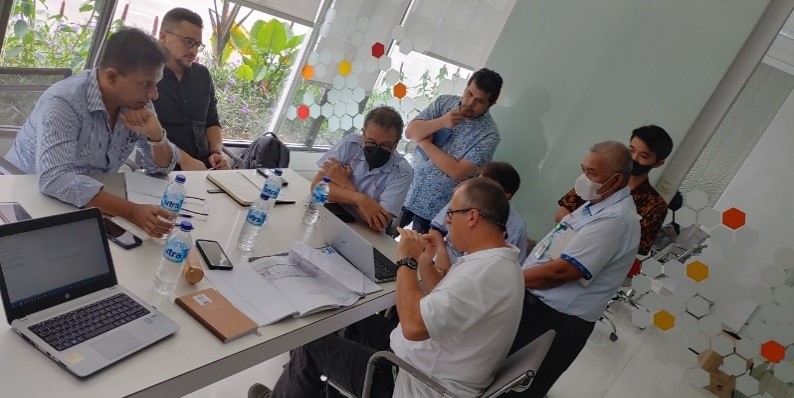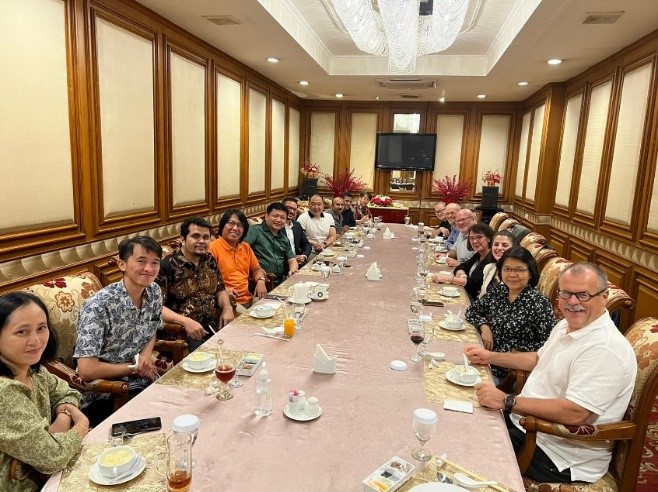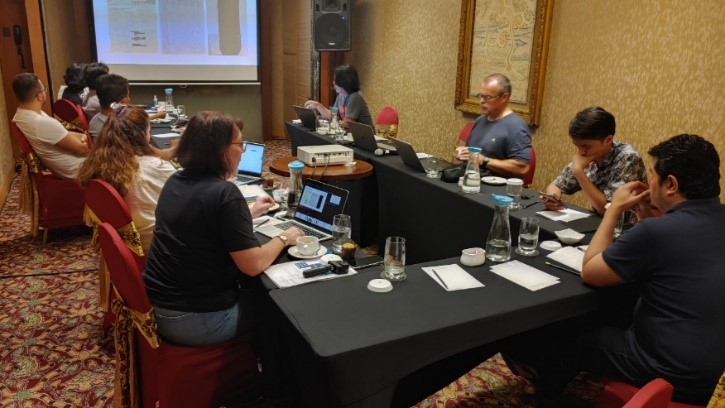

Enhancing Sustainability in the Indonesian Textile and Clothing Industry: project activities in Indonesia in September and November 2022
In September and November 2022, project partners from Indonesia and Germany visited the partner companies PT SriTex Group and PT Haraüpan Kurnia. The focus of the visits was on data collection and policy development in the areas of energy efficiency and renewable energies. The aim was to record the status quo for the procedures and processes used. For example, for dyeing and applying functionalities to textile surfaces or the operation of textile machines with electrical and thermal energy. Another important aspect was sustainability management with a focus on compliance, occupational health and safety, and chemicals management.

In detail, the German company Brückner (textile mechanical engineering) inspected the current operational management of stenters from different manufactures at both partner companies. Stenters are primarily used for the continuous drying of textile surfaces and require temperatures of up to 220°C, which are provided via natural gas or thermal oils. The company Brückner secured valuable practical experiences for the EnaTex project in close exchange with the employees and executives. The focus of the result evaluation was on measures to optimise the technical components and operational management in order to ensure continuous and energy-efficient operation.
The company SUNFarming (project planning of solar systems) focused on covering the potentials and the energy demand of textile production with renewable energies, especially photovoltaic systems (PV). As a result, production areas for the installation of rooftop PV were defined.

The researchers from Niederrhein University of Applied Sciences in cooperation with the team of Politeknik STTT Bandung identified processes used at both partner companies for dyeing and applying functionalities, such as breathability or moisture protection, to validate research in innovative ultrasound technology and minimal application processes in their laboratories.
The IZES and the Politeknik STTT Bandung examined the material and energy flows for the provision of thermic process energy on corporate and production base. Up to now, energy is primarily provided on the basis of domestic hard coal as well as via steam and thermal oil. An efficiency testing of the combustion system is part of the research, with a focus on possible waste heat potentials. Wastewater treatment and sewage sludge were subsequently part of the evaluation. In the further procedure, it was possible to agree on the potentials for the conversion from coal to alternative, defossilised energy sources.

The AUGE Institute of Niederrhein University of Applied Sciences and the Atma Jaya University elicited the state of the corporate social responsibility with a focus on occupational health and safety and chemical use in textile production. The project team interviewed the employees and undertook a document study to gather valuable insights. Especially the examination of the compliance implementation at the partner companies demanded an intensive exchange with management levels.
Ifeu examined the production chains for selected textile products to collect the individual production processes and the available data quality for the implementation in a life cycle analysis. A focal point was the discussion of the ecological and energetic goals as well as the implementation of in- and output streams of raw materials, products and wastes on a corporate- and process base. These activities provide a first basis for answering the questions of ecological footprints, like the CO2, water, and area footprint.
During the third project meeting on 20 November 2022 in Surakarta, first results of the joint work were discussed and next steps defined. Important milestones such as the 5th network meeting in Germany in June 2023 and the project conference in October 2023 were fixed.

All findings and results are expected to benefit not only the partner companies but also the Indonesian – and eventually international – textile industry in general.
For further information on the EnaTex project, please visit the project website.
